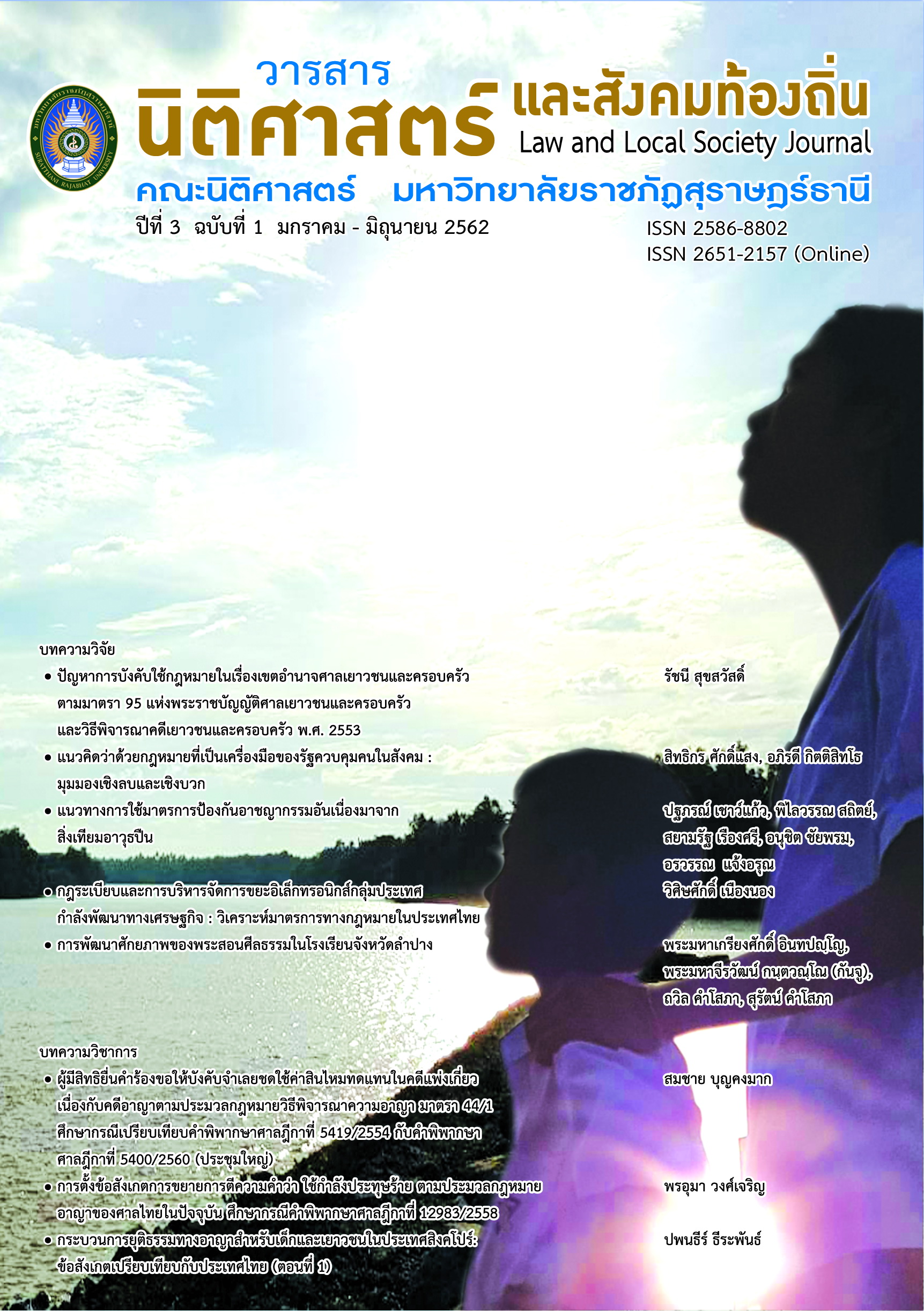กฎระเบียบและการบริหารจัดการขยะอิเล็กทรอนิกส์ในกลุ่มประเทศโลก ที่สาม: การวิเคราะห์เปรียบเทียบมาตรการทางกฎหมายในอินเดียและประเทศไทย
คำสำคัญ:
การบริการจัดการขยะอิเล็กทรอนิกส์, ประเทศที่กำลังพัฒนาทางเศรษฐกิจ, ประเทศที่กำลังพัฒนาทางเศรษฐกิจ, มาตรการทางกฎหมายบทคัดย่อ
ไทยเป็นประเทศที่กำลังพัฒนา ถึงแม้ไม่ได้เป็นสมาชิกขององค์การเพื่อความร่วมมือทางเศรษฐกิจและการพัฒนาของประเทศกลุ่มยุโรป (OECD) แต่ไทยก็เป็นสมาชิกของอนุสัญญาบาเซล (Basel Convention) ซึ่งกลุ่มประเทศสมาชิกเหล่านี้ได้ออกกฎระเบียบภายใต้ข้อบังคับของอนุสัญญาดังกล่าว ดังนั้น ไทยจึงต้องเผชิญกับปัญหาขยะอิเล็กทรอนิกส์ (E-Waste) ไม่ว่าจะเป็นปัญหาภายในประเทศและปัญหาในการนำเข้าขยะอิเล็กทรอนิกส์จากต่างประเทศ เพราะความล้าหลังและความซับซ้อนของกฎหมายที่ใช้ควบคุม ซึ่งมีความยุ่งยากอย่างยิ่งในการจัดการและควบคุมปัญหาเหล่านี้ ดังนั้น ไทยจึงต้องให้ความ สำคัญในการสร้างมาตรการและการออกกฎหมายสำหรับการจัดการและควบคุมขยะอิเล็กทรอนิกส์อย่างมีประสิทธิภาพ
เมื่อประเทศไทยไม่มีกฎหมายขยะอิเล็กทรอนิกส์บังคับใช้โดยเฉพาะ แต่รัฐบาลได้นำกฎหมายหลายฉบับมาประยุกต์ใช้ในการจัดการขยะอิเล็กทรอนิกส์ ซึ่งกฎข้อบังคับดังกล่าวนี้ ไม่ได้ช่วยในการจัดการและการรับมือกับปัญหาการนำเข้าและส่งออกขยะอิเล็กทรอนิกส์
ดังนั้น ผู้วิจัยเห็นว่า ประเทศไทยควรตรากฎหมายขยะอิเล็กทรอนิกส์โดยเฉพาะ และเพิ่มการจัดการและควบคุมการขนส่งและการนำเข้าไว้ในกฎหมายด้วย ซึ่งจะสามารถช่วยควบคุมและจัดการขยะอิเล็กทรอนิกส์ได้อย่างมีประสิทธิภาพมากขึ้น เพื่อเป็นการบริหารจัดการขยะอิเล็กทรอนิกส์ให้เหมาะสมและสอดคล้องต่อสถานการณ์ปัจจุบัน
เอกสารอ้างอิง
2. Basel convention on the Control of Transboundary Movements of Hazard Ousand Their Disposal http://www.basel.inst/ratify/convention (accessed January 20, 2008).
3. EEA (European Environment Agency). “Waste With out Borders in the EU?:Transboundary Shipments of Waste,” https://www.eea.europa.eu/ (accessed January 21, 2009).
4. Electronic waste is the waste that comes with technology’. Energy Saving, http://www.energysavingmedia.com/news/page.php?a=10&n=54&cno=4871> (accessed October 21, 2013).
5. EU Directive on WEEE 75/442/ EEC on waste of 15 July 1975.
6. Itthiphol Srisawalak. An Analysis regularity of WEEE and RoHs in the way of law. Bangkok: Thailand, 2004.
7. K. K. Basiye. “Extended Producer Responsibility for the management of Waste from Mobile Phone”. (Master of Science in Environmental Sciences, Policy & Management, Lund University, 2008.
8. “Organisation of Economic Cooperation and Development (OECD) Established in 1961,” http://www.oecd.org. (accessed January 20, 2008).
9. P. Georgiadis and M. Besiou. Sustainability in Electrical and Electronic Equip ment Closed-loop Supply Chains: A System Dynamics Approach, Journal of Cleaner Production 16, (2008). 1665-1678.
10. Thanansak Bovornnanthakul. Drafting laws operate under the Basel Convention: Report the summary for Executive. The management of solid waste and hazardous substances, Pollution Control Depart ment. Ministry of Natural Resources & Environment (2005).
11. UNEP. “Environmentally Sound Management of Used & End-of-life Mobile Phones.” Open-ended Working Group of the Basel Convention on the Control of Transboundary Movements of Hazardous Wastes and Their Disposal Sixth Session. Geneva. 3-7 September 2007.
ดาวน์โหลด
เผยแพร่แล้ว
รูปแบบการอ้างอิง
ฉบับ
ประเภทบทความ
สัญญาอนุญาต
บทความที่ได้รับการตีพิมพ์ในวารสารนิติศาสตร์และสังคมท้องถิ่น คณะนิติศาสตร์ มหาวิทยาลัยราชภัฏสุราษฎร์ธานี ถือเป็นลิขสิทธิ์ของวารสาร ทั้งนี้ ข้อมูล เนื้อหา และข้อคิดเห็นที่ปรากฏในบทความเป็นความรับผิดชอบของผู้เขียนแต่เพียงผู้เดียว กองบรรณาธิการไม่มีความจำเป็นต้องเห็นด้วยหรือร่วมรับผิดชอบใด ๆ
เนื้อหา ข้อมูล รูปภาพ และองค์ประกอบอื่น ๆ ที่ได้รับการตีพิมพ์ในวารสารฯ อยู่ภายใต้ลิขสิทธิ์ของวารสารนิติศาสตร์และสังคมท้องถิ่น การนำไปเผยแพร่ ดัดแปลง หรือใช้ประโยชน์ในลักษณะใด ๆ ไม่ว่าเป็นบางส่วนหรือทั้งหมด ต้องได้รับอนุญาตเป็นลายลักษณ์อักษรจากวารสารก่อน


